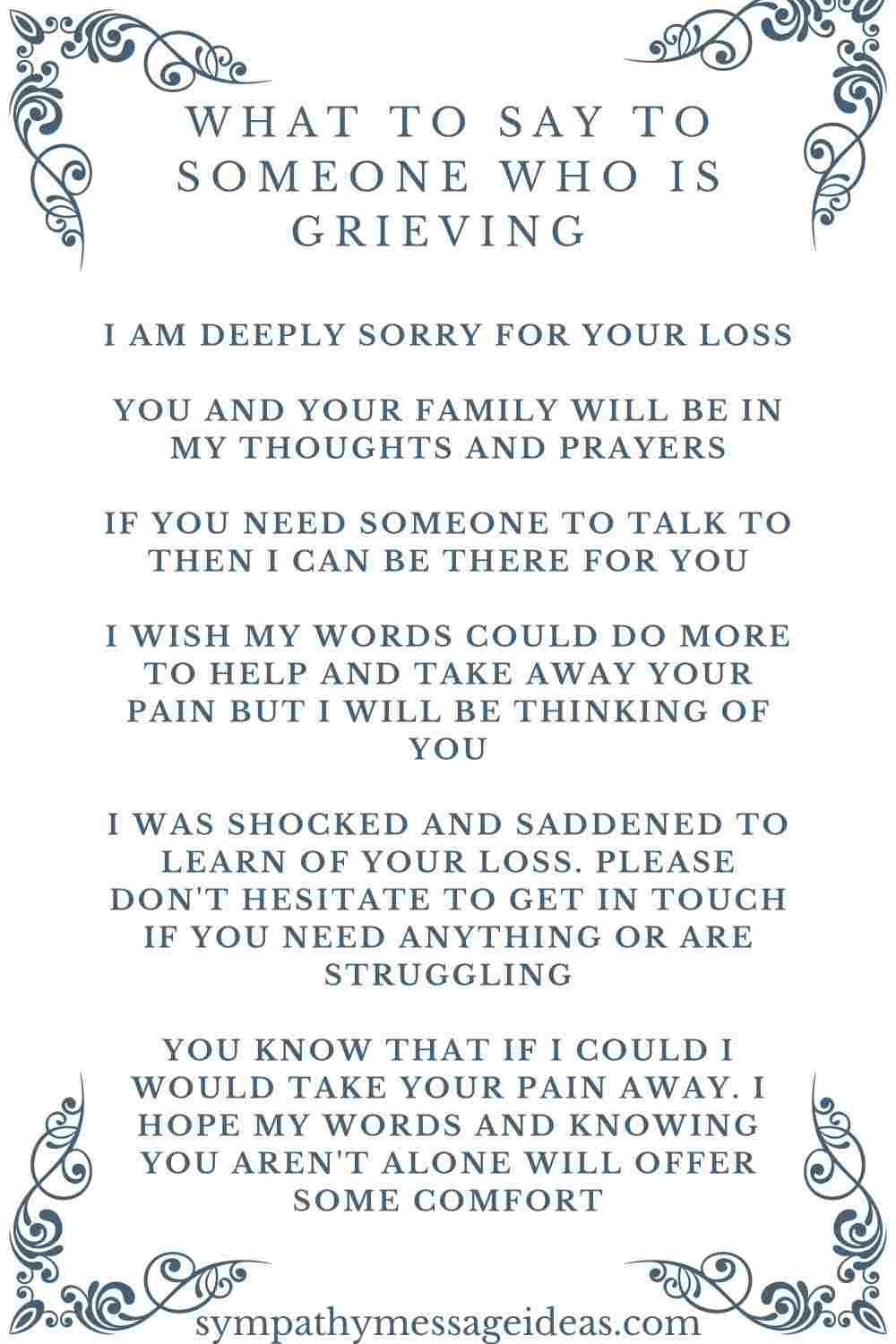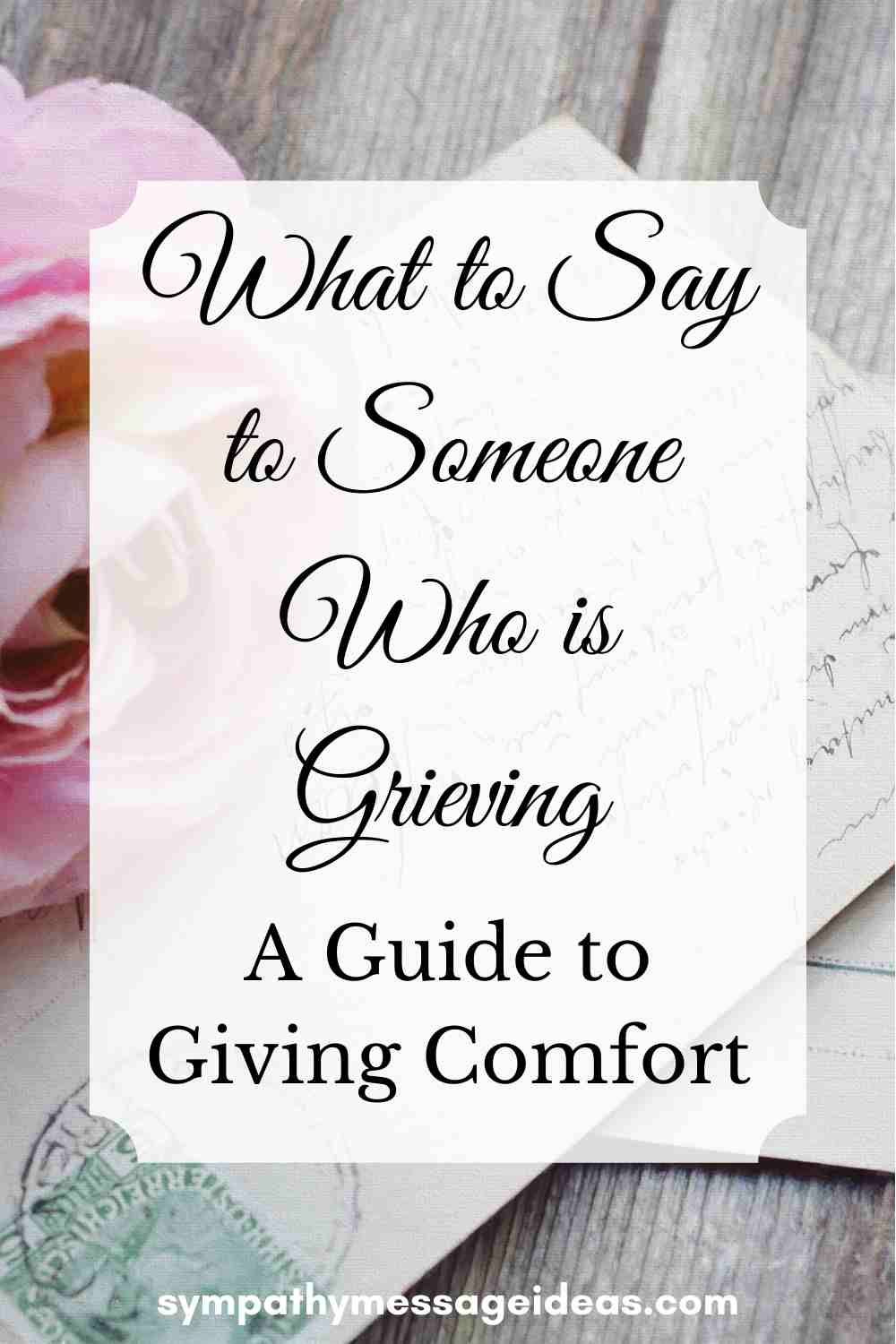When someone you know suffers a loss you may want to reach out or talk to them. Offering condolences for a loss is a kind and natural reaction. But there’s a good chance you’ve hesitated before saying anything and thought “what to say to someone grieving?”.
Don’t worry. You’re definitely not alone. Knowing what to say when someone has died isn’t something you just have built in.
It can be so difficult trying to find the perfect words to comfort those grieving. So much so many will actually avoid doing so.
It’s not uncommon to see people do all they can to steer clear of what is an uncomfortable conversation. (It’s well established we find others grieving uncomfortable). Or with little empathy who will just say anything without caring how it sounds or the effect it has on those mourning a loss.
The fact that you’re reading this shows you’ve gone to the trouble of trying to say the right thing and avoid the wrong things that may cause more upset.
That’s good!
But everyone will respond to and need different things to help them when dealing with a loss.
So what we write or say when someone is grieving needs to take that into account. Think of the type of person they are, how they lost their loved one, what you know they like and dislike.
There are however some well known things you can say that should help to offer comfort and express your sympathy in any situation.
Use the examples provided here and this guide to help you with comforting anyone who is grieving a loss.
What to Say to Someone Grieving
If you would just like some examples of the sort of comforting words you can say when someone is grieving then the messages below should be perfect.
- I am deeply sorry for your loss
- You and your family will be in my thoughts and prayers
- If you need someone to talk to then I can be there for you
- I wish my words could do more to help and take away your pain but I will be thinking of you
- I was shocked and saddened to learn of your loss. Please don’t hesitate to get in touch if you need anything or are struggling
- If there was anything I could do to help you know I would. I hope my words and knowing you aren’t alone will offer some comfort
- You have all my love and support during such a difficult time
- I am going to miss ______ so much. He/she was a wonderful and special person
- I can’t begin to imagine just how hard this must be. I am always here if you need need me
- ______ will be so very missed. They were such a warm and amazing spirit
If you want a more thorough, in-depth guide of how and what to say, why you should say it, and what not to say, then carry on below.
Offer your Condolences
Probably the easiest but one of the most important things to do when someone is grieving is to show your sympathy by acknowledging their loss. You don’t have to go over the top or make any sort of grand gesture but just simply say how sorry you are for their loss. The examples above are a good place to start if you aren’t sure what to say.
Listen and Let Them Talk
Listening to those grieving is just as important as knowing what to say.
When you suffer a loss it leaves you bewildered, frightened and confused. Those swirling emotions can become unbearable and being able to talk and try to make some sense of what’s happening is hugely beneficial (and often vital).
So being the person who is there to listen without judgement and let the bereaved talk is an extremely important role. Let them pour out their fears, ask why it happened, go through the horrible thoughts they’ve been dealing with and generally try to get some understanding.
What you say can be as simple as “how are you feeling?” or “do you want to talk?”. Make it clear you’re happy to listen to whatever it is they want to talk about whenever they feel ready. It’ll be one of the best ways you can help them.
Share Memories
Depending on how well you knew the deceased sharing memories you have of them or anecdotes about their life can be a touching and uplifting way to talk and remember them.
It can be as simple as “I will never forget your mothers warmth and generosity” through to a longer story involving the deceased. Remember to stay positive though and talk about the good memories you have.
Reassure Them
Losing someone is scary. And so is grieving. These are emotions and feelings the bereaved may never have felt before.
Emotions that can feel overwhelming and terrifying. So having people around them for comfort and support is really important.
What you should do and say when they’re struggling with how they’re feeling and the grief they’re experiencing is to reassure them. Let them know what they’re feeling is normal and expected.
Grief affects everyone differently and there isn’t a right or wrong way to go through it. Being reminded or told that is in itself reassuring.
You can’t make the pain go away or bring back their loved one. But you can try to help them through the worst of their grief by being a reassuring presence who is there to tell them it’s ok to cry, to scream, break down or even feel nothing at all.
Offer to Help
When someone is grieving one of the most helpful things you can do is to offer to help in some way.
But a mistake that’s commonly made when talking to those grieving is asking what they need. On the face of it this might seem like the right thing to be doing – offering your assistance or support for whatever they’re struggling with.
The problem with asking someone grieving what they need or would like is it put the emphasis on them. A lot of people don’t like to ask for things or worry about coming across like they’re being a nuisance or burden to their friends and family.
So instead of being honest and saying they need help with something they suffer in silence instead. The way to avoid this is to be specific with your questions.
So if you were going to ask “is there anything you need?” or “how can I help” try saying “do you need any help with cooking? I’m making a casserole and would be happy to do some extra for you” or “I know how hard it’s been for you recently so if you needed the kids taking to or picking up from school I can easily help out” or “I’m going to the store for some groceries, would you like me to pick you up some things as well?”.
This makes it easier for the bereaved to say yes and get the help they really need.
Be there for Them
Knowing you have friends and family there for you if you need them is a big part of coping with the grief after a loss.
So whatever it is you decide to do or say, make it clear you are there for the bereaved. Even when you know you can’t fix things or stop how much it hurts you can reach out to let them they aren’t alone.
And that makes a lot of difference to those who are doing their best to cope with their grief.
Stay in Contact
Grief lasts as long as it lasts. It may be weeks, months, even years. So those grieving need supporting and people around them throughout.
This means that you shouldn’t just think that by seeing them around the time of their bereavement, talking to them and maybe helping out that you’ve then done your bit and can sit back feeling good about yourself.
You need to be there for whoever it is grieving in the long term. So keep checking in on them, making sure they’re doing ok, talking and being there for them if they need you.
Basically – stay in touch.
Say Nothing
Sometimes it’s not about what you say but just about being there. Often when someone is going through the grieving process they might not feel up to talking but still want to spend time with a friend.
The presence of someone you know can be reassuring and calming amongst so much pain, even if you just sit quietly together.
So listen to and take your lead from them and don’t feel the need to fill silences or have to talk. What they’re comfortable with and prefer should be what you go along with.
What NOT to Say to Someone Who is Grieving
When talking to someone grieving there are some specific phrases and topics you should definitely not say or talk about.
Anything Religious
Talking about religion in regards to a death is often fraught with possibilities to cause upset or offence. If you knew the deceased and their family well and that they were religious then you can use your own judgement as to whether it’s appropriate.
But if you are in any doubt then it’s best to avoid saying anything religious and stick with sentiments that don’t have the potential to be offensive.
‘I Know How you Feel’
Comparing your own loss with someone else’s is never a good idea. Whilst you may have experienced something similar each loss and the way we grieve and feel after it is very personal and individual. So you can’t know exactly how someone else feeling. It’s much better to either say or do something from the examples above or just listen.
‘Give it Time’
Whilst we do tend to move past the pain of losing someone eventually, it never really leaves us. And the grief lives on just below surface. So talking about moving on after a certain time or waiting for it all to just get better could be seen as insensitive and is probably best avoided.
‘At Least they had a Long Life’
This may be true but it shows a complete lack of understanding about losing someone. Yes, they may have lived to 120 years old and had a wonderful life. But for a family to lose a loved one at any age is going to be heartbreaking. Saying goodbye to your mom or dad, for example, is devastating no matter how old they are or long they’ve lived. So don’t say this to anyone grieving – it won’t help.
‘Everything Happens for a Reason’
This, sadly, is used all too often to say to those grieving. There is never a good reason to lose a loved one. Maybe you think that ‘the universe has a plan’ or something along those lines but to the people grieving their departed friend, relative, child etc. there can be no good cause or reason for them to be gone. All they know is they miss them and want them back. Understand that and offer sympathy and support rather than saying ‘everything happens for a reason’.
What to Write to Someone Grieving
If you prefer to send a card or note to express your condolences and sympathy, rather than seeing and talking to the bereaved in person, then the examples below of what you could write should help:
- My deepest and most heartfelt condolences for your loss
- We are so terribly sorry for such a tragic loss
- You are always in my thoughts during these dark days. May you find comfort amongst friends and family
- Wishing you love and sympathy after a truly shocking loss
- May the memory of ______ always be with you, and may he/she rest in peace
- Hold on to those treasured memories and remember the best times. Our condolences
- My sincerest sympathy to you and your family
Conclusion
Knowing how to approach and what to say to someone who is grieving is very difficult. Although it may seem too hard at first it’s worth trying to figure what you’re going to say and how to talk to those grieving.
Mainly because this is the time they will need people like you the most. And actually people are very forgiving and understanding. If you say something that is t quite right or awkward they will understand and not hold it against you.
In fact they will just appreciate you making the effort and being there for them. If you can manage that you will have already helped, and from there communicating and finding the right things to say will become easier.




